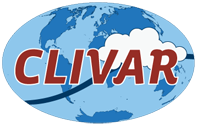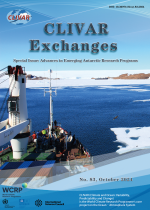Martin Visbeck
What is your current job/who do you work for?
 I am a full professor at the GEOMAR Helmholtz Centre for Ocean Research Kiel and at Kiel University in Germany
I am a full professor at the GEOMAR Helmholtz Centre for Ocean Research Kiel and at Kiel University in Germany
What is your background – how did you get to this point in your career?
I was trained as a physical oceanographer at Kiel University and finished with a Diplom degree. At the associated Institute for Marine Science (IFM) if continued and received my PhD in physical oceanography on a topic concerned with moored observations of deep ocean convection in the Greenland and Mediterranean Seas. Following the PhD I was offered a postdoc fellowship in the Climate and Global Change postdoc program of NOAA. My host was John Marshall at MIT in Boston USA. Two years later I moved to the Lamont-Doherty Earth Observatory (NY, USA) for my second postdoc and later became an Associate Professor at the Department of Earth and Environmental Science of Columbia University. Shortly after receiving tenure at Lamont and Columbia University I moved again and became full professor of Physical Oceanography at the IFM-GEOMAR and Kiel University where I still work and teach.
What do you enjoy about your job?
 I enjoy both the first class capabilities of observing the many physical aspects of the open ocean at GEOMAR in the Division of Ocean and Climate Dynamics and in particular in the Physical Oceanography group. I have a number of wonderful colleagues and we enjoy to work in teams on ‘big problems’. At the same time I get to educate bright students in the field of Climate Physics.
I enjoy both the first class capabilities of observing the many physical aspects of the open ocean at GEOMAR in the Division of Ocean and Climate Dynamics and in particular in the Physical Oceanography group. I have a number of wonderful colleagues and we enjoy to work in teams on ‘big problems’. At the same time I get to educate bright students in the field of Climate Physics.
Physical Oceanography is a global science and due to my own career and the diversity of projects I have had the pleasure to work in I have many friends and colleagues around the world. International science coordination, such as through the CLIVAR projects enables us to work more effectively and tackle issues that Germany alone could not address.
So I enjoy the variety of the challenges that every day brings and the great new discoveries we can make in our group and the field of physical oceanography in general. I also enjoy the freedom of mostly working on what I think is the most rewarding science.
What don’t you enjoy about your job?
I am under the impression that the scientific landscape has shifted from one, where actively engaging in science, by doing the work, the observations, the analysis and writing about new findings is more and more reduced by an increasing amount of time spent dealing with administrative tasks and fund raising.
What is a typical day like in your job?
 There are no typical days in my work, which is something I actually like! Most mornings I read my e-mails and look at the calendar to be reminded of the tasks that are so urgent that I really should deal with them during the day. This could be at home, in my wonderful office, in a hotel in Qingdao China or at sea on the German research vessel METEOR. Some days I get to revise a scientific paper that one of my collaborators has send to me. Other days I have to check meeting reports. Sometimes I am involved on writing proposals for small, medium size or even very large projects. Most days are filled with a number of meetings. They could be scientific discussions of a new idea, project based meetings to exchange information with team members, planning meetings for a research cruise, a new initiative in international science. Traveling between my office at GEOMAR to colleagues at Kiel University or the other building of GEOMAR across town and quite a bit of train of plane rides to Berlin, Bonn, Paris, New York or Beijing. SKPYE telephone conference are also part of my routine duties.
There are no typical days in my work, which is something I actually like! Most mornings I read my e-mails and look at the calendar to be reminded of the tasks that are so urgent that I really should deal with them during the day. This could be at home, in my wonderful office, in a hotel in Qingdao China or at sea on the German research vessel METEOR. Some days I get to revise a scientific paper that one of my collaborators has send to me. Other days I have to check meeting reports. Sometimes I am involved on writing proposals for small, medium size or even very large projects. Most days are filled with a number of meetings. They could be scientific discussions of a new idea, project based meetings to exchange information with team members, planning meetings for a research cruise, a new initiative in international science. Traveling between my office at GEOMAR to colleagues at Kiel University or the other building of GEOMAR across town and quite a bit of train of plane rides to Berlin, Bonn, Paris, New York or Beijing. SKPYE telephone conference are also part of my routine duties.
What are the key skills involved with your line of work?
I would like to say a deep understanding of the physical oceanography of the oceans. But increasingly I make use of communication skills in my interactions within the group, colleagues at the institute or within the Kiel Marine Science network or globally with the CLIVAR network. I enjoy giving lectures to students, colleagues at meetings and also speaking to public at large about the importance of the oceans. I am asked to review budgets, craft job adverts, manage project funds and mentor students and postdocs. In non of those areas I have ever received some professional training and I hope it does not show too obviously.
What top tips and advice can you offer to other people who may want to follow a similar career path to you?
A career in science and particular physical oceanography is very rewarding. One feels incredibly satisfied when an idea works out or a good paper gets published. There is a great amount of freedom for most marine scientists. However, it is not a well paid job, work is never finished and more often than not the work does not proceed as planned and through backs and mishaps are part of our daily life. It takes passion and dedication to pull through the rough parts.
If you are looking for a well paid and secure job with a well-planed workflow and predictable career look elsewhere.
If you love science and the ocean and enjoy working with a great bunch of colleagues around the world this is a great career path for you.













